











CHIEF ACADEMIC OFFICER
ANNUAL REPORT 2023




















A Healthcare Environment And Service That Supports And Values Education, Training, Innovation And Research Is Foundational To The Provision Of High Quality And CostEffective Patient Care.

1.0 Message from Chief Academic Officers 3 2.0 Highlights of 2023 4
3.0 Chief Academic Officer Group
4.0 “Development of an Academic Health Sciences System: The Foundation of Slaintecare”, May 2023 in Farmleigh House
5.0 Gathering momentum towards development of an Academic Health Sciences System
and Engagement
5

We are delighted to publish our 2023 Annual Report.
The HSE move to the Health Region structure and implementation of Slaintecare was planned in 2023, with the changes coming into effect 2024. This planning phase formed the backdrop to the Chief Academic Officers work in 2023.
We believe Sláintecare must be underpinned by an Academic Health Science System (AHSS), fostering optimal outcomes for patients and staff through strategic partnerships between academia and health. This healthcare system must integrate quality care seamlessly with Education, Training, Research and Innovation. Our previous annual reports outlined in detail the concept and benefits of an AHSS. At its core, an AHSS is a fully coordinated partnership between a university and a healthcare system resulting in better patient care and outcomes.
In early 2023, the CAO Group jointly organised a symposium titled “Academic Health Science Systems: The Foundation of Slaintecare” with the Hospital Group CEOs and the Community Care Organisation CEOs. Together with Irish and International colleagues, we looked to chart a future for Irish healthcare that explicitly values an AHSS model to improve the care of patients in hospitals, primary care, and the community.
During 2023, the ambition to develop an AHSS in Ireland was included in key HSE strategic documents including the Health Regions Implementation Plan (July 2023), and for the first time, academic affairs is included in the HSE central organogram. This annual report outlines the effort and engagement of the CAOs throughout 2023 and 2024 resulting in this achievement. Moreover, the agreement to appoint a National Chief Academic Officer (NCAO) post is a central aim for governance in 2024. The appointment of a NCAO will be pivotal to realising the potential for Education, Training, Research and Innovation (ETRI) within the regions.
We are in a time of change in Irish healthcare and with change comes opportunity. As we move into 2024, we look forward to formally outlining a strategy for the development of an Academic Health Sciences System and establishing a supportive structure within our health regions for the AHSS.
Finally, we want to take this opportunity to thank both Professor Owen Smith, CAO Childrens Health Ireland, and Professor Paul Burke, CAO UL Hospitals Group for their significant contributions to the CAO Group since 2017 and 2019 respectively. We have welcomed Professor Susa Benseler to the post of CAO CHI in March 2024, and look forward to welcoming the new new CAO for the HSE Mid-West upon their appointment.
2 Chief Academic Officer Annual Report 2023 Chief Academic Officer Annual Report 2023
TABLE
CONTENTS
The Chief Academic Officer Group: Left to right Prof Owen Smith, CAO CHI, Prof Helen Whelton, CAO SSWHG, Prof Anthony O’Regan, CAO Saolta, Prof Martina Hennessy, CAO Dublin Midlands, Prof Hilary Humphreys, CAO RCSI, Prof Tim Lynch, CAO IEHG, Prof Paul Burke, CAO ULHG.
OF
6
9 6.0 Partnerships
12 7.0 Education and Training of Healthcare Staff 16 8.0 Research and Innovation within our Health Service 25 9.0 2024: Priorities in Education, Training, Research and Innovation 30
1.0 MESSAGE FROM THE CHIEF ACADEMIC OFFICERS
3
Professor Helen Whelton, Chair, CAO Group On behalf of the Chief Academic Officer Group
2.0
HIGHLIGHTS OF 2023
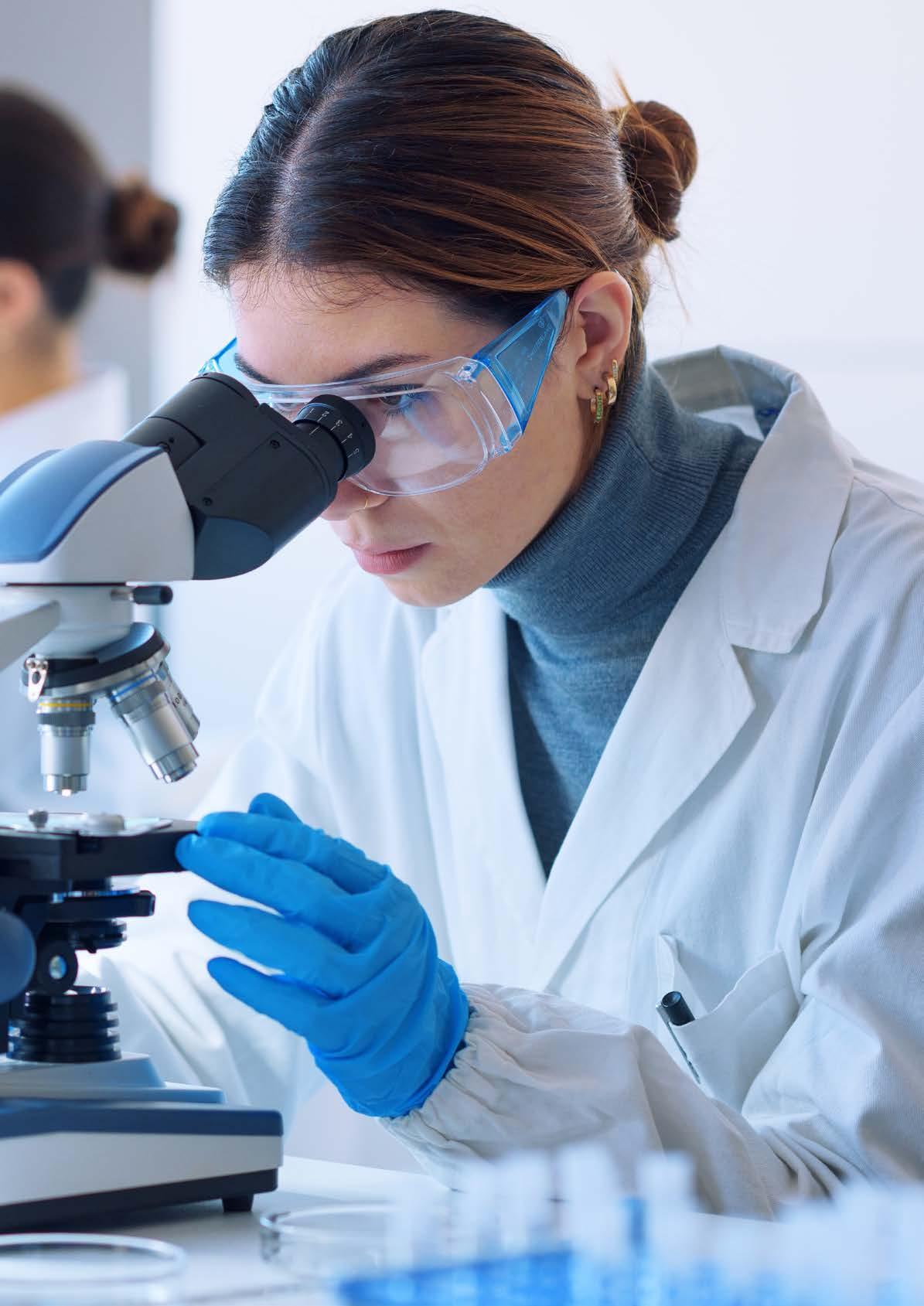

Academic Health Sciences Systems conference in Farmleigh House co-created between CAOs, Hospital Group CEOs and the Community Care Organisation COs
Academic Affairs within the HSE Central structure for the 1st time
The proposal for a National Chief Academic Officer centrally within the HSE
Launch of the National Simulation Office Power of Collaboration Conference: Building an AHSS in the Mid-West
New Director of Research posts for all regions National Research Ethics System progress
MoA between CHI and UCD, TCD, RCSI and Dublin City University signed creating the Paediatric Academic Health Sciences Centre (PAHSC)
Blueprint for the Leadership and Integration of Education, Training, Research, and Innovation within HSE Central and the Health Regions
Public Health Leadership partnership
ompletion of NDTP Clinical Educator Pilot with planned future roll out to all regions

3.0
CHIEF ACADEMIC OFFICER GROUP 2023




Professor HELEN WHELTON
• Chair, Chief Academic Officer Group
• Head of College of Medicine and Health, University College Cork
• Chief Academic Officer, HSE South/Southwest Hospital Group
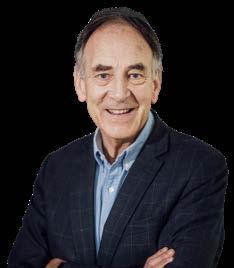
Professor PAUL BURKE
• MD FRCSI, Vice Dean (Health Sciences), University of Limerick (UL)
• Adjunct Professor of Surgery, UL GEMS
• Chief Academic Officer, UL Hospitals Group









Professor ANTHONY O’REGAN
• Consultant Physician, Galway University Hospital
• Chief Academic Officer, Saolta University Health Care Group
• Dean of the Institute of Medicine, Royal College of Physicians of Ireland

Professor TIM LYNCH
• Chair of Chief Academic Officer Group

Professor HILARY HUMPHREYS


• Senior Clinical Educator, Emeritus Professor of Clinical Microbiology, Royal College of Surgeons in Ireland (RCSI)
• Chief Academic Officer, RCSI Hospitals



• Vice Principal for Health Affairs, UCD
Professor MARTINA HENNESSY




• Consultant Neurologist, Mater Misericordiae University Hospital
• Chief Academic Officer, Ireland East Hospital Group




Professor OWEN SMITH
• Consultant Pharmacologist, St James’s Hospital.
• Chief Clinical Academic Officer
– Dublin Midlands Hospital Group
• Professor of Child, Adolescent & Young Adult Oncology, Trinity College Dublin
• Consultant Paediatric Haematologist at Children’s Health Ireland
• Chief Academic Lead, Children’s Health Ireland
5
Chief Academic Officer Annual Report 2023
4








“ACADEMIC HEALTH SCIENCE SYSTEMS: THE FOUNDATION OF SLAINTECARE”, FARMLEIGH HOUSE, MAY 2023
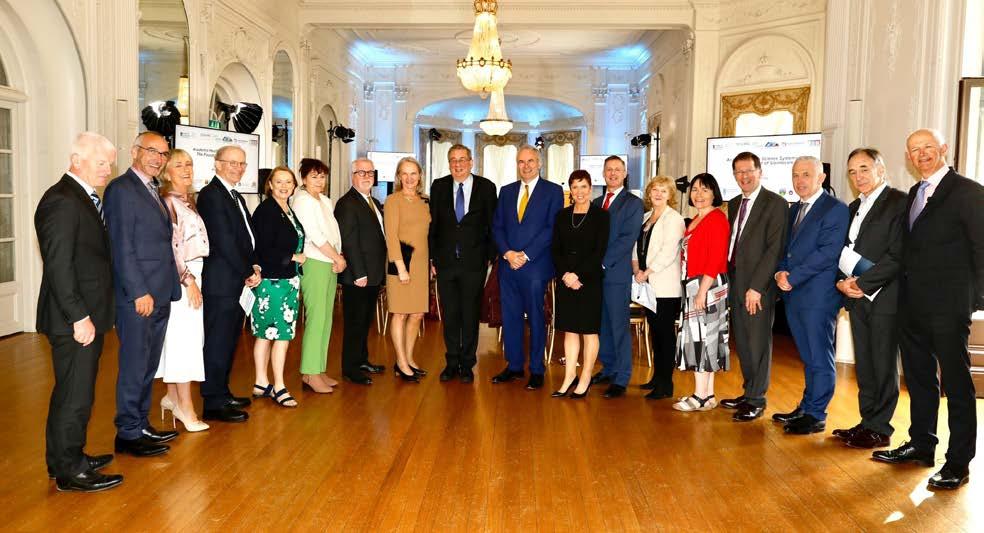
Meeting hosts and speakers L to R: Tony Canavan, CEO Saolta, Anthony O’Regan, CAO Saolta, Ruth Freeman, Director of Science for Society, SFI, Hilary Humphreys, CAO RCSI, Eilísh Hardiman, CEO CHI, Mary Day, National Director Acute Hospitals, HSE, Owen Smith, CAO CHI, Helen Whelton, CAO SSWHG, Dermot Kelleher, Dean of Faculty of Medicine, University of BC, Tim Lynch, CAO IEHG, Martina Queally, CO HSE Community Healthcare East, Trevor O’Callaghan, CEO DMHG, Martina Hennessy, CAO Dublin Midlands, Mellany McLoone, CO Dublin North City and County, David Burn, Director NHIP, John Higgins, CEO SSWHG, Paul Burke, CAO ULHG, Cathal Kelly, Vice Chancellor & Registrar, RCSI
The CAOs actively engaged with the Secretary General Dept of Health (DoH) and continue to engage with the DoH and HSE highlighting the benefit of an Academic Health Science System (AHSS) approach to Healthcare. An AHSS results in better recruitment and retention of staff leading to better patient outcomes and improved quality and patient safety. Moreover, research and innovation nurtured within an AHSS will add value to the State. We had insight into the benefit of University Academic Hospital Groups during the COVID-19 pandemic. They performed to a high standard whilst under huge clinical demand and pressure. The Hospital Groups, linked to their respective universities, assisted Level 2 and Level 3 hospitals, and the community services, and provided COVID-19 infection testing, vaccination
of the population and excellent patient care. The CAOs recognise that Ireland should avail of the efficient healthcare and educational systems that exist between the universities, Hospital/ Hospital Group structure and the community regions. We believe that Sláintecare will benefit if built upon these links. Active collaboration between universities, hospitals/hospital groups and community regions is an Academic Health Science System, which can underpin Slaintecare. Teaching, training, research and innovation should be supported and resourced for all aspects of clinical care in the acute and community services. It requires a central policy to support the AHSS model. The CAOs will continue to advocate for government policy to develop an AHSS model to underpin Irish Healthcare.










The CAO Group organised a meeting at Farmleigh House in Dublin in May 2023 on the value of the Academic Health Science System (AHSS) and how it could be used to implement Sláintecare. Together with colleagues from Ireland, USA, Canada and the UK , we charted a future for Irish healthcare that explicitly uses an AHSS to improve the care of patients in hospitals, primary care, and the community.
The meeting was conceived by the CAO Group and jointly organised with the Hospital Group CEOs and the Community Care Organisation COs. This ensured a comprehensive and holistic approach with members from each group contributing, chairing and facilitating insightful, engaging and constructive discussions.
coffee/tea and the lunch break, short vignettes provided insights on how an AHSS actually works in practice. The opening session set the scene and emphasised the interest and passion of healthcare and academic staff to support and improve Irish healthcare. The importance of trust and genuine partnership between the leaders of academia, the HSE and the Government Departments of Health, Higher Education and Innovation was emphasised in order to make an AHSS a reality. Funding of an AHSS should be viewed as a future investment that will yield clear, and accountable, benefit for
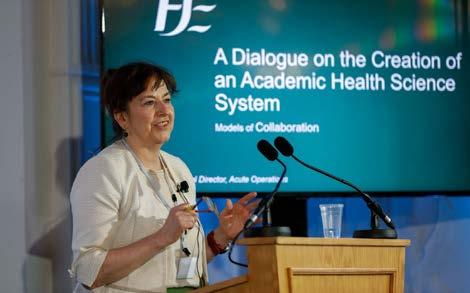
over
Just over 100 key leaders representing patients, healthcare, academia, research funders and others attended the meeting. The feedback was very positive. The high attendance highlighted the importance and necessity of the AHSS model to underpin the successful implementation of Sláintecare. In addition to lectures, panel discussions and vigorous
7 6 Chief Academic Officer Annual Report 2023 Chief Academic Officer Annual Report 2023 4.0
discussions
Left to right: Prof Anthony O’Regan, CAO Saolta, Dr Avril Kennan, CEO Health Research Charities Ireland, Prof Orla Feely, President UCD, Dr Colm Henry, Chief Clinical Officer, HSE, Prof John O Halloran, President UCC, Eilísh Hardiman, CEO CHI, Prof Paul Burke, CAO ULHG
Prof Mary Day, HSE National Director, Acute Hospitals




patients and staff. It will also enhance Ireland’s known reputation for excellent medical and nursing healthcare and boost its reputation as a leader in biomedical research. There is enormous potential commercial, economic and societal benefits from investing in education and research infrastructure to enable innovation, employment and partnership. This is especially relevant to Ireland where many top performing global pharma, medical device and clinical research organisations are headquartered but remain as sleeping giants with regard to development of the Irish Health Service.
The second session focused on implementation of the AHSS model, and specifically overcoming inertia and obstacles. Training partnerships are key to bring together medical, nursing, allied health professionals, pharmacists, data scientists etc. Big data can solve practical healthcare problems such as why repeat patients attend emergency departments. Sláintecare focuses upon population health, empowering healthcare networks and supporting people to live independently as possible in the community. Supported by data and digitally-enabled patient care with effective and honest integration between the various sectors. In particular, we need to remove silos , plan tactically beyond the day-to-day running of the health service, and develop the capacity and resources to provide state-of-the-art clinical training for our future healthcare workforce.


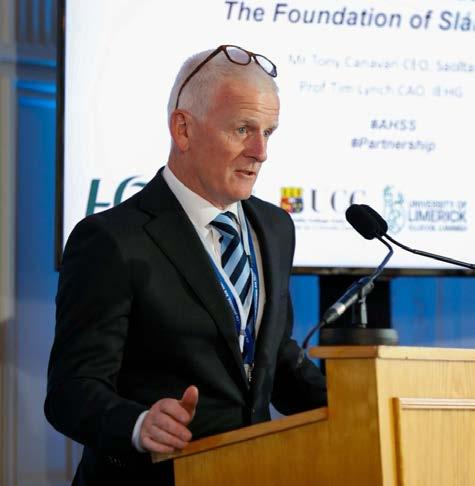
The third session focused on training and education elaborating upon the concept of academics and clinicians working together. Sláintecare needs to be underpinned by better career structures and supporting education and research across the healthcare system. For example, supporting practical research into healthcare process (e.g., how do I develop systems to get this elderly patient off this trolley?) might ensure meaningful pragmatic research. Linking researchers and trainees together will make healthcare more stimulating and exciting, thus fostering curiosity and enthusiasm leading to patient care improvements. Education and training must be integrated into all clinical service plans, with accountable and accessible training models. The COVID-19 pandemic taught us that flexibility in healthcare is vital to maximise training opportunities in primary care, in community care and in hospitals.
The final session emphasised that Sláintecare is a new beginning for the Irish health service. The AHSS model underpinning Sláintecare, will provide better outcomes for patients, foster innovation, attract and retain our brightest and most talented healthcare staff. The next steps should prioritise strong governance and leadership, work on greater integration between the various sectors and address infrastructure needs.
Further details and information on this meeting can be found HERE.













5.0


GATHERING MOMENTUM TOWARDS DEVELOPMENT OF AN ACADEMIC HEALTH SCIENCES SYSTEM
The Farmleigh event in May affirmed a number of important logics,
• The benefits of research and innovation in generating new knowledge, creating value and improving patient outcomes are selfevident, but can only be fully realised when the research ecosystem, academia and the health service are intentionally integrated and accessible to healthcare leadership, practitioners, and service users at every level and in equal measure.
• Compliance with legal accreditation standards and development of supportive learning environments are critical to attracting, retaining, and empowering high quality healthcare practitioners for the future.
• An environment and service that supports and values education, training, innovation and research (ETRI) must become central to the foundational ideology of Slaintecare.
• Adoption of Academic Health Science System (AHSS) principles as part of health policy will obligate such excellence to become the standard model of practice.
New structures and partnerships are required to shape the future of the academic health sciences within the HSE and therefore post Farmleigh, the CAO group have focused on developing the mechanisms by which AHSS principles can become embedded into HSE and Dept of Health implementation plans for Sláintecare. Positive discussions were held throughout the summer with Dept of Health and HSE leadership and the Presidents of Irish Universities, all critical partners in the AHSS endeavour.
At a pivotal meeting Mr Liam Woods, Director, HSE, and Ms Jo Shortt, Senior Project Manager, HSE, invited the group to develop a Blueprint for Leadership and Integration of Education, Training, Research, and Innovation within HSE Central and the Health Regions. The document submitted in November 2023 addresses key elements for the integration of Education, Training, Research and Innovation (ETRI), including a recognition that performance must be nuanced and aligned with regional strengths and capacities but also accounted for and driven centrally to meet the future needs of Sláintecare.
The document sets out,
• Principles, structures and a target operating model for the governance and support of ETRI at a regional level.
• Third level partnership considerations including renewal of Memoranda of Agreements and mechanisms to establish formal channels of cooperation between the higher education sector and regional structures.
• The role of the Regional Chief Academic Officer in oversight of the ETRI functions.
• Early to mid-term outputs and key deliverables for ETRI functions.
• Recognition of resources required to support ETRI in a systematic manner.
Importantly it establishes the need for a new strategically important role of National Chief Academic Officer with responsibility for Integrated Education, Teaching, Research and Innovation across health disciplines in active partnership with
9 8 Chief Academic Officer Annual Report 2023 Chief Academic Officer Annual Report 2023
Prof Helen Whelton, CAO SSWHG, Chair CAO Group Tony Canavan, CEO Saolta Hospital Group
the Universities. This will establish for the first time a distinct academic affairs function within central HSE structures.
“The proposal for a Chief Academic Officer role centrally within the HSE provides enormous opportunity for truly imbedding Education, Training, Research and Innovation within our health service. In doing this, we will improve patient outcomes and increase levels of staff recruitment and retention”
-Dr Colm Henry, Chief Clinical Officer, HSE
Within that plan (HSE Health Regions Implementation Plan) we have committed to “build on the closer relations established over recent years between Academic Teaching
Hospitals and Hospital Groups to ensure that the benefits of Academic Health Science systems are embedded into the design and the culture of Health Regions. The aim is to foster even closer working relations between health and social care services and the further and higher education system at regional and at national level, promoting excellence in clinical practice and clinical efficiency, to include a community care focus as well as in acute settings”.
- Liam Woods, Director, HSE
Much has been accomplished and we expect this will be an area for intense activity over the next year. The diagram briefly sets out the progress of work to date.
6.0
PARTNERSHIPS & ENGAGEMENT
Partnerships & Engagement of the CAO Group 2023
20th January
Prof Patrick Mallon, Consultant in Infectious Diseases, St Vincents University Hospital, and Prof Colm Bergin, Consultant Internal Medicine, Blackrock Health, re Biobank May
16th February
Letter to Minister Stephen Donnely re Feedback on Draft New Consultant Contract
“The proposal for a Chief Academic Officer role centrally within the HSE provides enormous opportunity for truly imbedding Education, Training, Research and Innovation within our health service. In doing this, we will improve patient outcomes and increase levels of staff recruitment and retention”
- Dr Colm Henry, Chief Clinical Officer, HSE
CAO submission to Impact assessment on the geographical alignment of CHOs and HGs to RHAs July
Dr Colm Henry, Chief Clinical Officer, HSE re lead university representatives for ongoing communication with HSCP office
25th October Blueprint for Leadership and Integration of Education, Training, Research, and Innovation within HSE Central and the Health Regions
27th November
Bernard Gloster CEO HSE, Colm Henry, CCO HSE, and Liam Woods, Director, HSE, re CAOs within central HSE structure
18th May CAO Annual Meeting “Academic Health Science Systems: The Foundation of Slaintecare”
See Report Here
21st February
Dr Alan Wall, CEO HEA, re Additional Student Placements Infrastructure
14th June
Liam Woods, Director, HSE, re Academic Health Sciences System (AHSS) model as the foundation of the Health Regions
23rd August
Key meeting with Liam Woods, Director, HSE, and Jo Shortt, Senior Project Manager, HSE, re Health Region Implementation and developing an AHSS
27th October
Liam Woods, Director, HSE, re CAO within the central HSE structure
29th Sept
Prof Brian O’Connell, Dean of Health Sciences, TCD re Academic Dental Leadership concerns
24th February

21st April
Meeting with Bernard Gloster, incoming CEO HSE
Martin Varley, Secretary General, Irish Hospital Consultants Assoc. re new proposed Consultants Contract
December
Assurances sought from CEOs of Hospital Groups re continuity of existing clinical placements in light of new geographical alignments
6th November
Dr Colm Henry, CCO, HSE, re Oral Health, Specialisation in Dentistry and Clinical Leadership
7th July
Dr Ana Terres, Assistant National Director, Research & Evidence, re new Director of Research roles and Chief Academic Officer within the Health Regions
20th Oct
Aoife Lawton, National Health Service Librarian for the HSE (Manager, Health Library Ireland)
10th November
Derick Mitchell, CEO, IPPOSI re embedding patient engagement within the new Health Regions
21st July
Prof Anthony O Regan re NCHD Taskforce
4th December
Dr Colm Henry re Oral Health, Specialisation in Dentistry and Clinical Leadership
15th December
Dr John Cuddihy, Director, Public Health, re CAO partnership with Public Health
20th Oct
Prof George Shorten, Professor of Anaesthesia, UCC, re National Learning Analytics for Healthcare Professionals 17th November SPARK Labs re proposal for the establishment of the HSE Spark Frontline Clinical Design and Innovation Labs 18th December
Bernard Gloster, CEO HSE, Dr Colm Henry, CCO HSE, and Liam Woods, Director, HSE, re leadership positioning of CAO within the Health Regions
Chief Academic Officer Annual Report 2023
11
10 Chief Academic Officer Annual Report 2023




POWER OF COLLABORATION: BUILDING AN ACADEMIC HEALTH SCIENCES SYSTEM IN THE MIDWEST
On December 8th, 2023, the “Power of Collaboration: Building an Academic Health Sciences System in the Midwest” conference, was hosted by the Health Sciences Academy and led by Prof Paul Burke and Miriam McCarthy. The steering committee included representatives from UL Hospitals Group, University of Limerick, Midwest Community Healthcare, and Public Health MW. The programme focussed on population health, education, innovation and research’s impact on patient outcomes as pillars of an academic health sciences system.
Featuring a panel with institution leaders Prof Kerstin May (UL), Prof Colette Cowan (ULHG), Ms Maria Bridgeman (MWCH), Dr Mai Mannix (Public Health), and Prof Vincent Cunnane (TUS), the conference stressed the importance of collaboration in teaching, research, and innovation. Regional clinicians and academics shared examples of its benefit and impact in healthcare delivery, education, and research.
Keynote speaker Prof David Burns, Pro-ViceChancellor of the Faculty of Medical Sciences, Newcastle University, and Director of the Newcastle Health Innovation Partners academic health science centre, as keynote speaker, shared Newcastle University’s success in academic health sciences, focusing on improved patient care and transformative health systems.
Prof Helen Whelton closed the event, summarising and outlining future ambitions.
Next steps: governance establishment, agreement refinement, funding determination, research, innovation and education priorities, and population health integration.
The event can be viewed here: The Power of Collaboration Building an Academic Health Science System in the Midwest










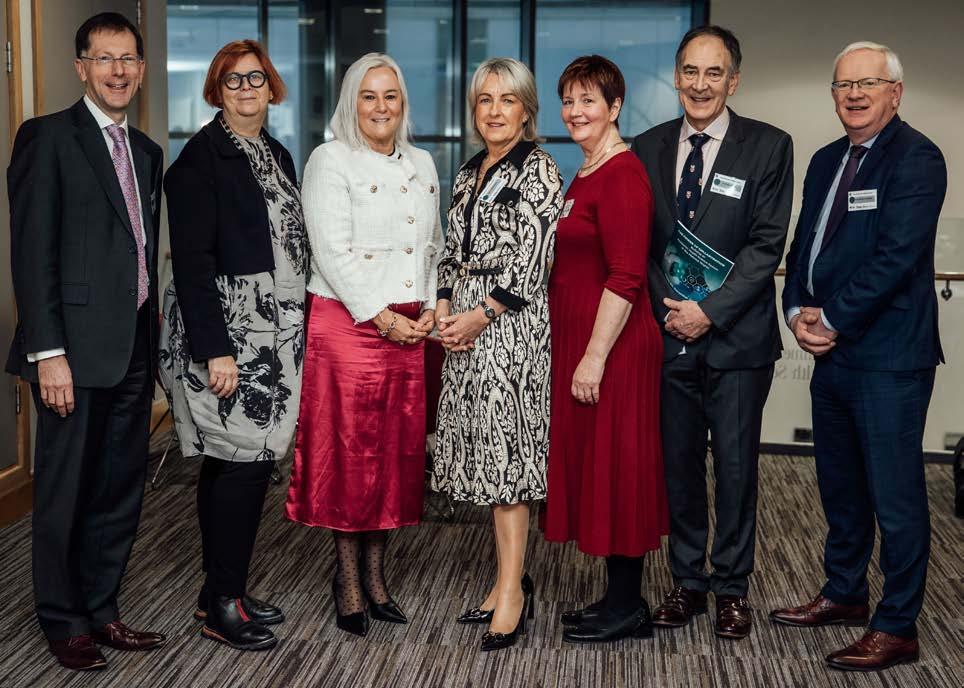
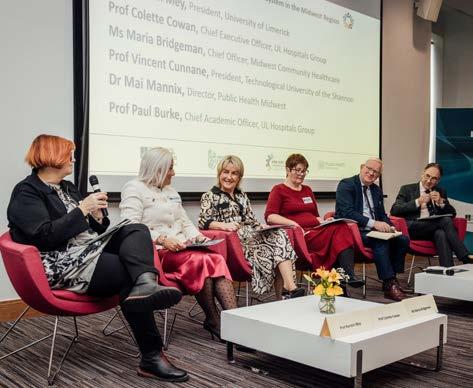












13 12 Chief Academic Officer Annual Report 2023 Chief Academic Officer Annual Report 2023
left to right: Keynote Speaker: Professor David Burn, Director of Newcastle Health Innovation Partners (NHIP), Pro-Vice Chancellor and Professor of Movement Disorders Neurology, Newcastle University, Professor Kerstin Mey, President University of Limerick, Professor Colette Cowan, Chief Executive Officer, UL Hospitals Group, Maria Bridgeman, Chief Officer Midwest Community, Dr Mai Mannix, Director of Public Health Midwest, Professor Paul Burke, Chief Academic Officer / Vice Dean (Health Sciences), UL Hospitals Group & Professor Vincent Cunnane President of TUS.
Left to right: Professor Kerstin Mey, President University of Limerick, Professor Colette Cowan, Chief Executive Officer, UL Hospitals Group, Maria Bridgeman, Chief Officer Midwest Community, Dr Mai Mannix, Director of Public Health Midwest, Professor Vincent Cunnane President of TUS & Professor Paul Burke, CAO/ Vice Dean (Health Sciences), UL Hospitals Group.
6.2
Left to right: Prof Helen Whelton, Head of College of Medicine & Health, UCC, and Chief Academic Officer, SSWHG, and Professor Rose Galvin, Professor in Physiotherapy, University of Limerick.

6.3
Launch of St Vincent’s UCD Cancer Centre
In November, the St. Vincent’s Healthcare Group and the UCD School of Medicine launched the St. Vincent’s UCD Cancer Centre. The primary objective of this joint venture is to seamlessly integrate the world-class patient care provided at the hospital with cutting-edge research and education conducted at the university. The shared vision is to usher in a transformative era in cancer care, significantly enhancing outcomes for patients.

6.4
Signing of MoA Between CHI And UCD, TCD, RCSI And DCU

Memorandum of Agreement (MoA) between Children’s Health Ireland (CHI) and University College Dublin (UCD), Trinity College Dublin (TCD), Royal College of Surgeons Ireland (RCSI) and Dublin City University (DCU) was signed in 2022 creating the Paediatric Academic Health Sciences Centre (PAHSC)
6.5
Paediatric Academic Health Sciences Centre Board
The PAHSC Board formed in late 2002 and chaired by Professor Dermot Kellegher who is recognized internationally for innovation in academic health leadership and administration, clinical care, research and education. Dermot serves as the Dean of the Faculty of Medicine and Vice-President, Health at the University of British Columbia. The PAHSC Board have now met on 4 separate occasions in 2023.
6.6
New CAO for CHI
Professor Susa Benseler was appointed as the new Chief Academic Officer to CHI in 2023 replacing Professor Owen Smith who was acting CAO since 2017. Professor Benseler formally took up her post in March 2024.

6.7
Organisation of European Cancer Institute (OECI)
Accreditation

European Cancer Institute (OECI) Accreditation is a mark of high-quality cancer centres working with an academic partnership. Such partnerships
6.8
have enabled cancer centres in Cork, Galway and Limerick to embark on the accreditation journey. Trinity College Dublin and St James Hospital were first to achieve this quality standard in 2019 followed by Beaumont and RCSI in 2022.
CUH partnering with UCC are applying for accreditation as a centre and are on track to meet the 30th April self-assessment submission date followed by Peer review in September by a group of international auditors. Some of the work undertaken in the past six months includes strategy development, documenting patient pathways and securing ACT funding for patient satisfaction kiosks.
University of Galway, partnering with the Saolta Hospital group, have applied for accreditation as a network (as opposed to a centre) and completed their self-assessment in March 2024 with Peer review expected by the end of the year.
Partnership with Public Health Leadership
A meeting between the CAO Group and Dr John Cuddihy, Director of Public Health, HSE, identified significant common ground between the work of Chief Academic Officers (CAOs) in promoting the development of an Academic Health Science System (AHSS) and Public Health initiatives.
“I recognize significant synergies between the work of the Chief Academic Officers and that of Public Health and I look forward to working collaboratively to achieve an Academic Health Sciences System in Ireland.”
- Dr John Cuddihy, Director of Public Health, HSE
The CAOs and Dr Cuddihy discussed the implementation of Sláintecare and reconfiguration of Irish healthcare towards the HSE Health Regions and advocated for collaboration between the CAOs and Public Health leadership at regional and national levels. Proposed next steps include an in-person meeting between the Public Health Leadership Team and the CAOs to foster this partnership and mutual understanding.























Chief Academic Officer Annual Report 2023
Speakers L to R: Professor Michael Keane – Dean, UCD School of Medicine and Acting CEO at St Vincent’s University Hospital; Dr David Fennelly – Clinical Director of St. Vincent’s UCD Cancer Centre; UCD President, Professor Orla Feely; Professor Risteard O’Laoide – Director, National Cancer Control Programme; Liam Gallagher –Scientific Director, St Vincent’s UCD Cancer Centre
L-R, Professor Michael Keane (UCD), Professor Veronica Lambert (DCU), Ms Eilish Hardiman (CHI), Professor Colin Doherty (TCD) and Professor Hannah McGee RCSI)
14 Chief Academic Officer Annual Report 2023
Prof Susa Benseler, Chief Academic Officer and Head of Paediatric Health Affairs, Children’s Health Ireland (CHI)
EDUCATION & TRAINING OF HEALTHCARE STAFF
The planning and development of high-quality education and training across the health regions is a key strategic aim for CAOs. The National CAO group actively engaged across sectors through 2023 to advance this aim.
The National Taskforce on NCHD Workforce.
The chair of the Taskforce was the Saolta CAO, Professor Anthony O’Regan. The taskforce sought broad stakeholder engagement, and Prof O’Regan met formally with the CAO group to outline the proposed plans and seek feedback and input. The final Taskforce report was accepted by the Minister and formally launched in Jan 2024. Of note, the Health Regions and CAOs were central to its recommendations. Recommendation 19 commented upon the key role of the CAO in providing strategic and operational governance for education and training in the emerging health regions.
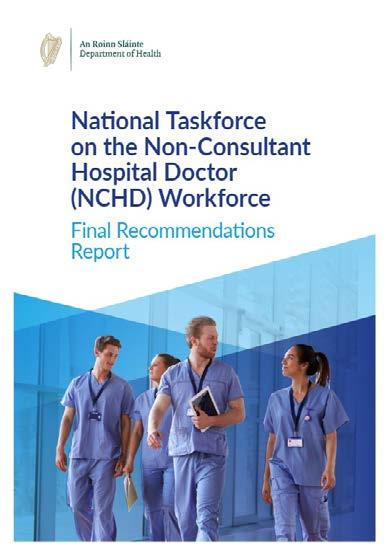


















































17 Chief Academic Officer Annual Report 2023 Chief Academic Officer Annual Report 2023 7.0
Clinical Sites
Medical Director Medical Lead Medical Lead Medical Lead Medical Lead Group Director for Medical Senior Manager Admin support
NDTP
16
Hospital Group/ Health Region
Professor Anthony O’Regan, CAO Saolta, and Chair of the National Taskforce on NCHD Workforce Clinical Educator Programme
Members of the taskforce attending the launch of the report
Education & Training Year in Review (2023)
The Group Director of Medical Education and Training – Clinical Educator Programme Model

 Professor John Cooke, NDTP & S/SWHG Director for Education & Training
Professor John Cooke, NDTP & S/SWHG Director for Education & Training
This project, funded by NDTP, is to establish a Hub and Spoke model for doctor education and training across the hospital groups, and subsequently the evolving health regions. The project is aligned with the CAO objective to support high quality inter-professional education and training across clinical sites. The NDTP has worked closely with the CAO to roll out this programme. In 2022 funding was provided to two hospital groups, and a third group was funded in 2023. The plan is to fund the remaining hospital groups or health regions in 2024
The governance of this project reports through the CAOs to the hospital group CEO. The CAOs are represented on the NDTP steering group (Prof Helen Whelton, Prof Anthony O’Regan). The first phase of this work is to ensure clinical educational leadership and administrative
supports are put in place at all hospital sites. Specific key performance indicators have been agreed and will evolve over time.
The key initial focus for these roles is to implement the NCHD Taskforce recommendations. Notable achievements include the delivery of protected time for NCHD induction, the development of enhanced induction for doctors new to the Irish medical service, and a phased development of enhanced infrastructure for NCHD work and training including rest and educational spaces, and enhanced information technology.


Appointment of consultants as site-leads for postgraduate medical E&T Foundation meeting S/ SWHG Faculty for Postgraduate medical E&T
Focus on UHK & Tipp UH
Sim Stars 2023 - bringing sim to our clinical training sites
€308,000 - Amount spent on infrastructure & other enhancements for education & training
Enhanced Induction for International Medical Graduates
Developing Partnership at S/SWHG
Launch of Mentorship programme for NCHDs in standalone positions UHK & Tipp UH
Enhanced alignment if undergraduate & postgraducate strategy
7.2
Launch of Mentorship programme for NCHDs in standalone positions UHK & Tipp UH
UCD Health Systems & The Mater Lean Academy 10th Lean Healthcare Symposium and The Personcentred Lean Six Sigma Model Booklet Launch
The 10th Annual Lean Healthcare Symposium took place on Friday 10th November in Croke Park. The symposium celebrated a 10-year milestone welcoming over 200 delegates from national and international health centres.
The event also saw the launch of The Personcentred Lean Six Sigma Model booklet written by Dr Séan Paul Teeling.
The Mater Lean Academy has provided 10 years of healthcare improvement using the Personcentred Lean Six Sigma methodology in Ireland and works with UCD Health Systems to provide Lean Academy programmes.




19 18 Chief Academic Officer Annual Report 2023 Chief Academic Officer Annual Report 2023
7.1
Dr Bernadette Lynch, NDTP & Saolta Director for Education & Training
“Galway University Hospital Enhanced Induction, July 2023





7.3
Student Clinical Placements
Supporting clinical placements for healthcare students across all disciplines is an essential consideration for the emerging health regions. The CAOs continued to work on and highlight this issue across the health sector, including meeting with HSE colleagues and department of health.
The CAOs welcomed engagement with a number of relevant leaders in the HSE and Department of Health. In early 2023, the group corresponded with Dr Alan Wall, CEO Higher Education Authority (HEA), regarding critical infrastructure requirements within the Universities, in response to the initiative to expand the number of places for healthcare
students in response to national workforce needs. A major limiting factor in the creation of additional places for health care students is the availability of student placements in the health care setting. The CAO Group highlighted concerns that the health care infrastructure for students is less than optimal. With competing demands health care settings are challenged to meet the current needs of students because of limited space for students and staff numbers.
The CAOs will continue to work with the leadership in the health service to identify opportunities to address the barriers to clinical placement provision.
7.4
Simulation-Based Training – Launch of the National Simulation Office (NSO)
The CAOs were pleased to support the Launch of the NSO and the appointment of Professor Dara Byrne as National Clinical Lead for Simulation on October 12th 2023. This is a key development in health education, training, and patient safety. It follows on from key work undertaken by the CAOs and Professor Byrne in supporting the delivery of high quality simulation in Ireland in 2022. For example, the use of simulation in response to the Covid-19 pandemic in 2020-21. The CAOs are looking forward to working with and supporting Professor Byrne in this important new national role.
Guided by the Basic Assumption, a global core value, the NSO creates a safe learning environment, believing participants are intelligent, capable, and eager to improve.
An immediate NSO priority is faculty development, education, and establishing a simulation community of practice. Plans include spearheading projects and partnerships in education, translational simulation, and capacity development.










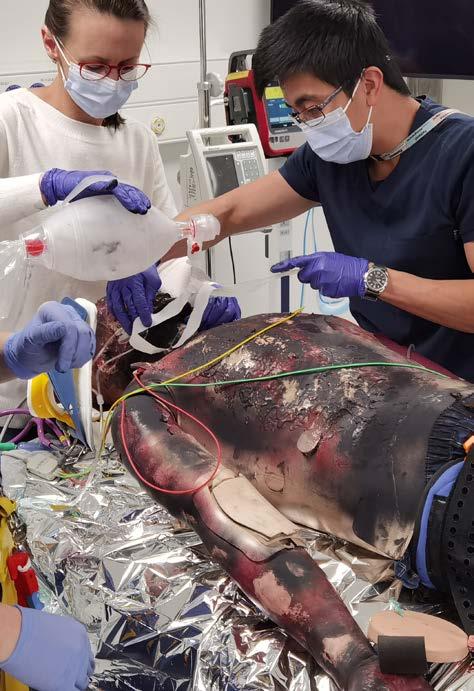

“I am delighted to take up this challenging role and to be supported by multiple clinical partners, the Chief Academic Officers and the Chief Clinical Officer Dr Colm Henry. I plan to use my experience in simulation facility and faculty development to ensure that simulation is interprofessional and effective and will enhance the safety and quality of healthcare and transform healthcare delivery to support the every evolving health system.
It is an exciting time in health professions education. Modern simulation is directly linked to improved patient safety through its impact on the interprofessional teams’ performance. It is an effective way to support a lot of the changes we are seeing in our systems and in how we educate and train our students and staff. It is critical that when resourcing simulation, we do so across the continuum of health professions education which is in line with activities in an Academic Health Science System. There is a lot of change and simulation is an essential part of that change. It can support growing numbers of students and trainees, it can prepare learners better for clinical practice through its ability to shorten learning curves. It can enhance the implementation of integrated models of care, identify and mitigate risk and provide a renewed focus on quality improvement.”





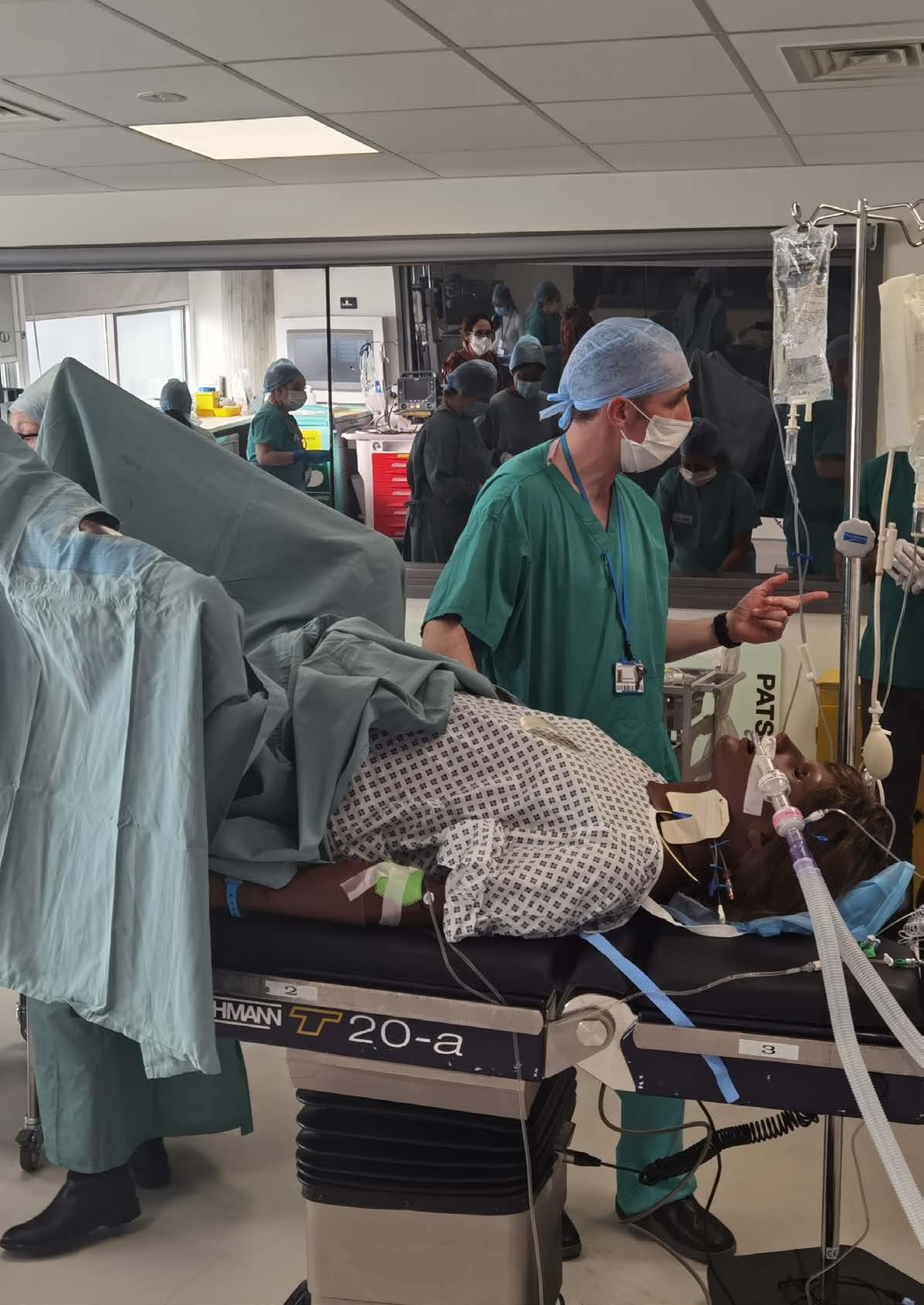
20 Chief Academic Officer Annual Report 2023
- Professor Dara Byrne, Director, National Simulation Office
21 Chief Academic Officer Annual Report 2023
Professor Dara Byrne, Director, National Simulation Office
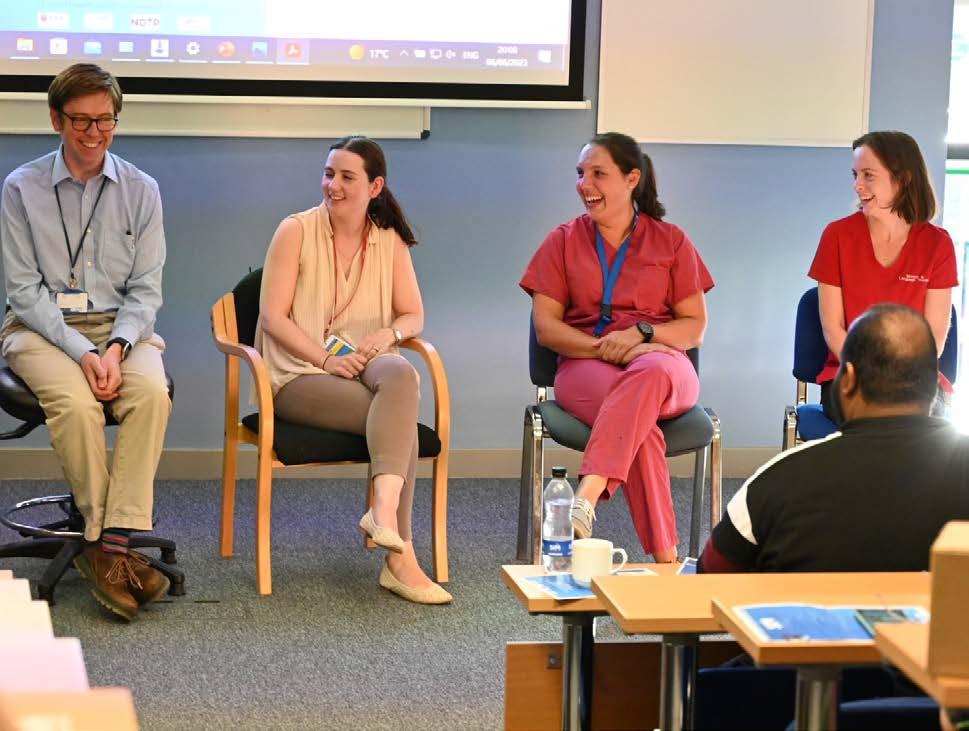
7.5
Simulation within the Hospital Groups
In 2023, simulation development made significant progress within hospital groups.
Simulation techniques probed the new Children’s ED before its December 2023 opening.
7.6
Interprofessional Learning and the AIPEC Challenge:
The Simulation Steering Group, established in November 2023, prioritizes creating a network and strategy for widespread simulation use. Successful programs involving Stroke, Paediatrics, and Obstetrics teams were implemented, along with the Emergency Department Resuscitation training days.
In SSWHG, SimStars 2023 showcased success, with five hospital teams reaching the finals at UCC in June. The theme, ‘communication,’ saw the CUH Stroke team emerge victorious, integrating simulation training into education sessions.

















































between various healthcare professionals with different skills and knowledge. Interprofessional education is recognised as a global priority (WHO 2010) and interprofessional teamwork is at the core of Sláintecare.













The best health outcomes for the many and increasing number of people with complex or chronic healthcare needs often depends on effective teamwork and collaboration
The All-Ireland Interprofessional Healthcare Challenge (AIPEC) serves as a prime example of how universities are taking proactive steps to instill the importance of this collaborative approach among health discipline students. AIPEC is an intervarsity competition for health discipline students to collaboratively address complex care issues with professionals. On 24th March 2023, AIPEC, hosted at NUI Galway and coordinated by UCD Health Affairs,was about a patient with a complex stroke and complex social needs.
Chief Academic Officer Annual Report 2023 23
Winning Sim Stars 2023 team: Stroke Team CUH
22
Winning Sim Stars 2023 team: Stroke Team CUH























7.7
HSE Library
The CAOs met with Ms Aoife Lawton, National

Health Service Librarian, to discuss the ongoing development of library resources for healthcare workers across Ireland. The CAOs were consulted and invited to input into the HSE Library 2024 - 2029 Strategy. Following review, the CAOs provided feedback on this important educational resource.
“The Chief Academic Officers are a key stakeholder group and it was great to have the opportunity to exchange knowledge with the Group in 2023. Their input helped to shape a new 5 year HSE Library Strategy”, - Aoife Lawton, National Health Service Librarian
Recognising HSE Library as an indispensable resource for clinical staff and a crucial facilitator of evidence-based care, discussions with local staff in the Universities revealed some considerations for the strategy, including:


8.0
RESEARCH AND INNOVATION WITHIN OUR HEALTH SERVICE 8.1 Research Governance:
Work of the CAOs to support the development of a research infrastructure in Ireland has extended to interactions with the HSE regarding the new Consultants Contract which came into being in 2023. Protected time for teaching, training and research within the contract is a key to ensuring an AHSS can develop in Ireland to underpin Sláintecare. This type of protected research time would facilitate the development of strong, local R & D functions.
The overall implementation of the National RGMS Framework includes the establishment of a HSE National Committee for the Governance, Management and Support of Research, and the CAO’s are represented on this Committee by Professor Helen Whelton.
The implementation of the National RGMS Framework includes several programmes of change – progress on these in 2023 includes the following:
• Encouraging the exploration of collaborations with universities for journal subscriptions and mechanisms allowing staff access to university resources, particularly for those health services affiliated with universities
• Potential partnerships with the Health Research Board and integration with the Cochrane Library subscription initiative.
• The need for easily accessible, 24/7 availability of full-text journals in digital format was underscored
• Ensuring seamless access for HSE staff via a portal, accommodating the prevalent use of mobile devices for information sourcing
• Prioritisation of investment in digital resources over print materials such as books
• Configuration of spaces to maximize study areas and reduce reliance on reference books
“During 2023 HSE Research & Development continued to drive forward the implementation of the National RGMS Framework. To fully-embed a culture of research within the health and social care services requires a large programme of often complex change to be undertaken,”
- Assistant National Director Research and Evidence, Dr Ana Terres.
“This would not be possible without the support, insight and collaboration of a wide range of stakeholders. The CAO’s have been a key champion of our efforts to up-level how we do research in the HSE, and we look forward to continuing to work together throughout 2024”.
One of the key outputs of the HSE Action Plan for Health Research is the HSE National Framework for Governance, Management and Support of Research (National RGMS Framework), the development of which was led by HSE National Research and Development with the support of the Chief Academic Officers (CAOs) and other stakeholders.

1. The reform of the existing Research Ethics Committee system in line with international standards.
2. The establishment of new functions for research governance, management and support at local, regional and national levels.
3. Roll out of the National Electronic Research Information Management System (NERMS) to enable an integrated approach to ethics and RGMS approval protocols and to facilitate collaboration between organisations.
4. The development of research related policies, guidance and national SOPs to promote standardisation of practices and minimise duplication of effort and costs.
Further information
For more details on the implementation of the national RGMS Framework, please visit the HSE Research website at https://hseresearch.ie/ governance-framework/ regional
25 24 Chief Academic Officer Annual Report 2023 Chief Academic Officer Annual Report 2023
8.2
Research Governance project: Integrated Research Governance (IRG) UCC/SSWHG
Regionally, projects are advancing to enhance research processes by implementing the National RGMS Framework. In the SW Region, the Integrated Research Governance (IRG) project Chaired by Prof Helen Whelton, CAO SSWHG & Head of College of Medicine & Health, UCC is creating a collaborative environment among SSW HG, UCC, and HSE hospitals. This initiative aims to facilitate seamless interaction, fostering knowledge exchange for improved healthcare and academic research. Notably, progress over 18 months includes developments in contract pathways, document submission, and communication. The project and working groups have identified 41 process improvement elements to enhance research support access for HSE and UCC researchers. Achievements so far include a streamlined data-protection review process for UCC Sponsored trials and the hiring of Research
Manager roles. Upcoming goals involve appointing a Director of Clinical Research and aligning with UCC’s Patient Advocate Team for better patient advocacy on the IRG office board.
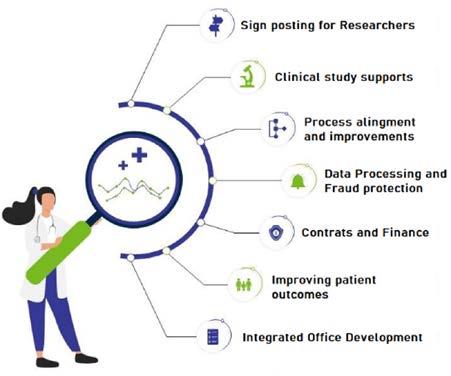
8.3
Establishment of Research Directorates in the new HSE Health Regions
One of the key pillars of an academic health sciences system is a robust research governance system. Building on the work of the CAO group nationally/ building on the foundations established by the CAO group nationally, the HSE has established research directorates in each of the new healthcare regions. The appointment of Prof Declan Lyons as Director of Research in the Midwest is the first of these appointments. He took up his post in November.
The post aims to support research projects from small student studies to complex interventions investigations and multicentre international trials. The Directorate will provide a single point of entry for researchers and hopefully streamline the process of getting research studies approved, supported and brought to a productive conclusion. The ultimate aim is to facilitate reliable high-quality and innovative clinical research which improves health outcomes for people in the midwest and beyond.
8.4
UCC Academic Health Sciences (AHS) Grant
The College of Medicine & Health in UCC has launched the Academic Health Sciences seed funding awards, with a submission deadline of 10th May 2024 to support new collaborations amongst the Academic Health Sciences System partners, including the SSWHG and Cork Kerry Community Healthcare.
The continued development of an Academic Health Sciences System in the SouthWest region is a key priority for UCC that is now embedded in the UCC strategic plan.
AHS awards will provide seed funding of up to €10,000 or up to €30,000, to support novel projects proposed by new, multidisciplinary collaborative teams to develop larger grant applications to national, international and/or European Commission funded calls to support the on-going development of the work and maximise impact.



8.5
Patient and public voice in Research within an AHSS

In a meeting with Professor Sean Dineen, PPI Ignite Network Leader, in July, the CAO Group discussed approaches and considerations for meaningful engagement with public and patients within research in our healthcare system.
“The PPI Ignite Network aims to build capacity for meaningful involvement of public and patients in health and social care research in Ireland”
outlined Professor Dinneen. Important discussion was had around how to truly imbed PPI within our health service and how this might look as we move to the health regions. Describing the work done by PPI Ignite, Prof Dineen advised,
PPI Ignite Network Values and Principles
“In addition to providing PPI training and education, the approach we are taking includes leading and encouraging innovation in PPI and aligns closely with the aim of the Chief Academic Officers to develop Academic Health Science Systems across our health service. We look forward to future partnership with the CAO group around these shared goals”.
Transparency
The PPI Ignite Network believes that, in order to improve public and patient involvement (PPI) in health-related research, there must be a shared understanding of the values and principles that underpin the work. We invite all researchers, PPI contributors, institutions and funders to consider how to uphold these values and principles when engaging in or supporting PPI activity.
Respect
The recognition of the roles, knowledge, insights, experiences, strengths, limitations and contributions across the research team and PPI partners and throughout the research lifecycle. We want to benefit from the diversity of the team and partners and work together effectively and enjoyably.
Trust
The building of reciprocal trust; this takes time to develop, is relationship based and needs to be consistently worked on.
We want everybody’s opinion to be fully heard and we want confidentiality to be negotiated and respected.
Flexibility

The need for clear, open, mutual communication between the research team and PPI partners about research decisions and progress.
We want transparency in developing a clear, shared understanding of aims, roles, processes and other terms of involvement.
Empowerment & Power Sharing
The inclusion as early as possible in funding decisions, strategy and decision-making, the co-design and co-production of research.
We want a wide range of involvement strategies to ensure that this happens.
Collaboration & Partnership
The inclusion of PPI partners throughout the research lifecycle with commitments and expectations agreed from the outset, as much as possible.






The recognition of the time and other commitments involved in PPI and that this is acted upon in the research plan.





























Equity & Inclusion


We want true partnership where all contributions are valued and respected equally.





The active identification and removal of barriers and creation of entry points throughout the research lifecycle.







We want to co-design appropriate changes and responses to the experiences and to the views of PPI partners.








We want real co-design and partnership to take place that values equally people’s diversity of opinions, experiences, abilities, backgrounds and expertise


27 26 Chief Academic Officer Annual Report 2023 Chief Academic Officer Annual Report 2023
TRINITY PPI IGNITE OFFICE
Sign posting for Researchers Clinical study supports Contracts and Finance Integrated Office Development Process alingment and improvements Data Processing and Fraud Protection Improving patient outcomes
UCD Health Affairs Academic Health Science System Grant 2022/2023
The UCD Health Affairs AHSS Grant aims to stimulate collaboration between IEHG, its affiliated community healthcare organisations, general practitioners (GP)and the UCD College of Health and Agricultural Sciences (CHAS). In doing this, it raises awareness of to benefit of an Academic Health Science System approach to healthcare and fosters synergies between UCD CHAS, UCD Health Affairs, IEHG, GPs and community areas.
28 excellent applications were received in 2023 and the AHSS Grant was awarded to four projects.
AHSS Grant 2022/2023 Awardees:
• Renal Functional Reserve Assessment in Obesity led by Prof Neil Docherty.
• Health and Wellbeing of the Health Workforce Across Maternity Settings (MatWell) led by Prof Jonathan Drennan.
• telTaz Digital Mental Health Assessment Tool for Children: a Usability Study led by Prof Aisling Mulligan
• Quantifying Circulating Tumour DNA in Uveal Melanoma Patients; Improving Care led by Dr. Patrick Murtagh
RCSI
Hospital Group
– Identifying Patients at High Risk of Relapse with Multiple Myeloma
A clinical trial has identified patients with multiple myeloma with high-risk disease. Some patients will live up to 10 years or longer while other patients die within two to three years. A trial on 7 sites involving 120 patients including in Beaumont Hospital has confirmed that the presence of a novel gene called Sky92 identifies patients at risk of early relapse. With colleagues in the UK, efforts are under way to incorporate this test into the standard practice. This will lead to risk adapted clinical trials and more individual personalised clinical care for these patients in the future.Uveal Melanoma Patients; Improving Care led by Dr. Patrick Murtagh
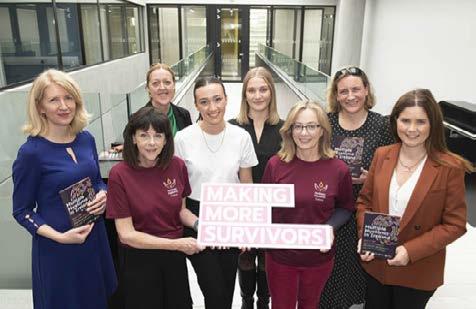
Trinity-St James’s evolving Research and Innovation Landscape
In 2023 St James’s Hospital released its research strategy (2023-2028) that sets the foundation in place to be a leading hospital in terms of research output and impact. The plan sets out a vision to create an Academic Health Science Campus (AHSC) for the benefit of patients, the community and the knowledge economy. The AHSC will bolster advancement of clinical trials, new treatments and cutting-edge research
which includes personalised, precision medicine and individualised patient journeys.
Actions include closer collaboration between research units and with Trinity College Dublin and a model of pairing scientific and health systems researchers with clinicians to ensure a bench to bedside to population approach is utilised fully.
8.9
Tallaght Hospital and Trinity College Dublin celebrate 25-years of Partnership
In June 2023 Tallaght University Hospital with its academic partner Trinity College Dublin celebrated 25 years since 115 patients and 1,500 staff transferred from the Meath, Adelaide and National Children’s Hospitals to the Tallaght site. The Hospital now employs over 3,000 staff with over 60 nationalities represented in its workforce. Growth of services and infrastructure has not stood still with over €75 million invested in expansion of clinical, research and learning spaces allowing Tallaght to maintain a deep and ingrained tradition of patient care, but also of innovation and education.

8.10 Innovation

In recent years, health innovation in Ireland has experienced significant growth, enabled by a national, government-backed ecosystem that fosters groundbreaking research, development, and commercialisation of healthcare solutions. Ireland is the second largest exporter of medical devices in Europe and is home to 10 of the top 12 pharma companies worldwide.
In 2023, CAOs met with HSE Spark, an initiative that encourages an innovation and design thinking approach among healthcare staff, supporting innovative processes in healthcare delivery. The independent yet collaborative working relationship between each player in the ecosystem ensures support is provided where needed at each stage of the healthcare innovation pathway.
In Ireland, embedding clinical innovation into the innovation process is a challenge. The development of an Academic Health Sciences System is an opportunity to drive this change.
“Lack of budget, limited data capture/ sharing ability, poor digital infrastructure coupled with lack of resources, time and formal support to engage in innovation, is a challenge and presents an opportunity for the AHSS in Ireland to ensure healthcare is a key player in the Irish Healthcare Innovation ecosystem”,
Says Dr Tanya Mulcahy, Director Health Innovation Hub Ireland.
“Our Healthcare Innovation ecosystem is something to be proud of, but we could do so much more if our clinical healthcare system was a fully embedded and enabled partner.”
There is a strong appetite for clinical innovation among healthcare staff; the HIHI-EI Clinical Innovator Award was developed to stimulate, capture and support commercially viable healthcare innovations from clinical staff has received 66 applications since it started in 2022, the 7 winners (figure 1) are working with academic intuitions to further develop their idea into product.
















29 28 Chief Academic Officer Annual Report 2023 Chief Academic Officer Annual Report 2023 8.6
8.7
Members of the team involved in the multiple myeloma project, including Professor Siobhán Glavey
8.8
2024: PRIORITIES IN EDUCATION, TRAINING, RESEARCH AND INNOVATION
In 2024, the CAO Group is focused on formalising a strategy for Academic Health Science System (AHSS) development, establishing regional structures for an AHSS, and strengthening interfaces between universities and the Health Service Executive (HSE). The group will agree key deliverables relating to regional structures to be implemented within three years.
The CAOs will continue to promote the need for a national policy to support the AHSS model in Ireland because this will improve patient care and provide value for money in healthcare, whilst improving staff recruitment and retention.
There will be continued support for and progress with NERMS, RECs, Directors of Research and Research Offices, as well as development of the interface with Health Innovation Hub Ireland and HSE Spark. A key priority for the CAOs is to foster innovation within the health service.
The launch of the NCHD Taskforce report in 2023 was a key step to improving the lives of our healthcare workforce. Engagement with implementing NCHD taskforce findings and collaborating with the National Doctors Training and Planning (NDTP) on education schemes will be important.
The future of simulation-based training is bright and its potential is vast. Ongoing engagement with the National Simulation Office will be key to leveraging the potential of simulation-based training throughout the country.
Student placement issues need to be resolved, and predictability for placements must be a key priority for the CAOs.
The following CAO Group goals for 2024 focus on transforming patient care through Education, Training, Research and Innovation.
Key Priorities for the CAO Group in 2024
Strategy and Engagement Education And Training Research & Innovation

Appoint a National Chief Academic Officer and establish the New Regional Chief Academic Officer role integrating University and Health sectors
Engage with HSE and various other government agencies to develop an AHSS strategy. Components of this are likely to include: Regional Structure with an interface between HSE and Universities.
Establish a highlevel process to integrate the University and Health Sectors in the common goal to develop Academic Health Science Systems in the new health regions.
Organise the CAO Annual Meeting
Work with NDTP to support the roll out of the clinical educator programme across all Health Regions in 2024 & 2025 with a network of clinical educators
Develop and support the implementation of key 2024 priorities from the NCHD taskforce in conjunction with clinical sites
Engage with the National Director of SimulationBased Training to identify key priorities for the next three years with key aim to appoint Director of Simulation for each health region to enhance quality and patient safety
Strengthen links with postgraduate training bodies including the evolving Intern structures. Support and advocate for student clinical placements across regions for all disciplines in medicine, nursing, and HSCPs
Appoint with the HSE Directors of Research across all regions to develop patient focused research to enhance health outcomes Lead the implementation of a research governance framework with Regional Directors of Research, including a code of practice across all regions
Work with Health Innovation Hub Ireland to promote and support clinical staff to develop innovation concepts with the aim of increasing the number of Clinical Innovators in Ireland, and to develop a mechanism to facilitate clinical immersion for Irish based companies.
Work with the HSE Spark Innovation Programme to advance the roll out of ‘Clinical Design and Innovation Labs’ across the newly established Health Regions with a network of Clinicians, Innovators, Designers and Researchers
30 Chief Academic Officer Annual Report 2023
9.0
31 National CAO Regional CAO Clinical Educator programme HSE Directors of Research Research Governance Framework implementation Support clinical staff to develop innovation concepts Roll out of ‘Clinical Designw and Innovation Labs’ NCHD Taskforce National Director of Simulationbased Training Postgraduate training bodies CAO Student clinical placements AHSS Strategy 1 2 Integration of University and Health sectors CAO Annual Meeting 3 4 5 6 7 8 9 12 13 11 10 Chief Academic Officer Annual Report 2023




CHIEF ACADEMIC OFFICER
ANNUAL REPORT 2023









































































































































 Professor John Cooke, NDTP & S/SWHG Director for Education & Training
Professor John Cooke, NDTP & S/SWHG Director for Education & Training
















































































